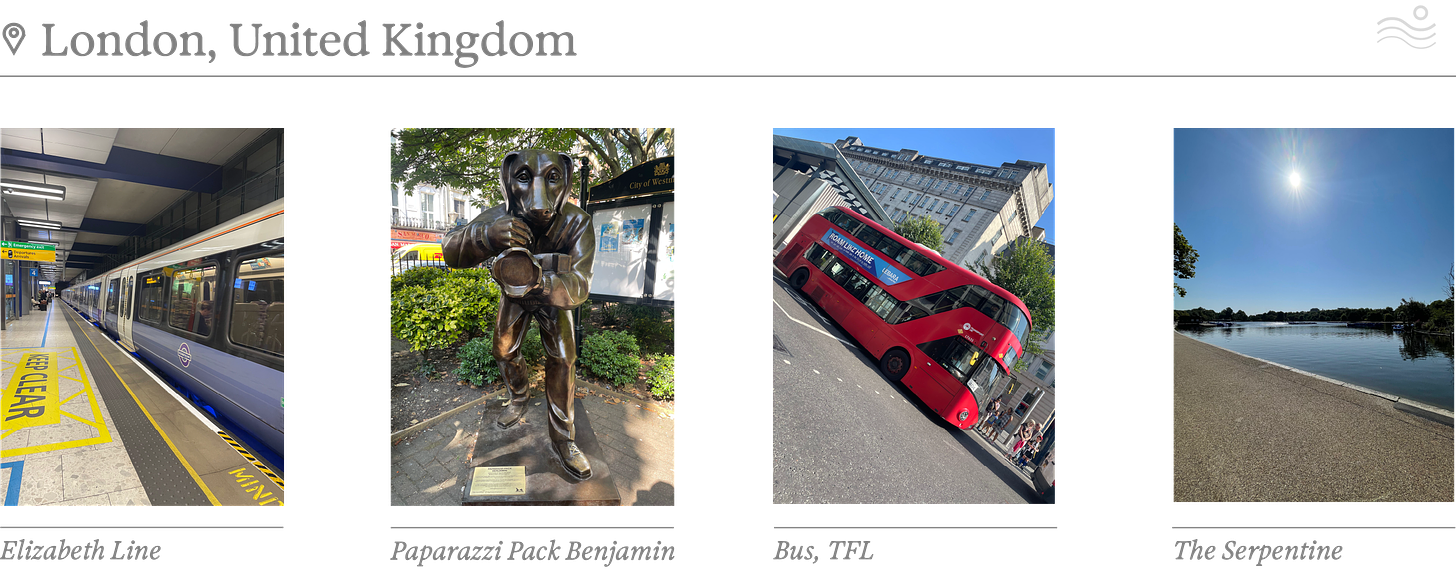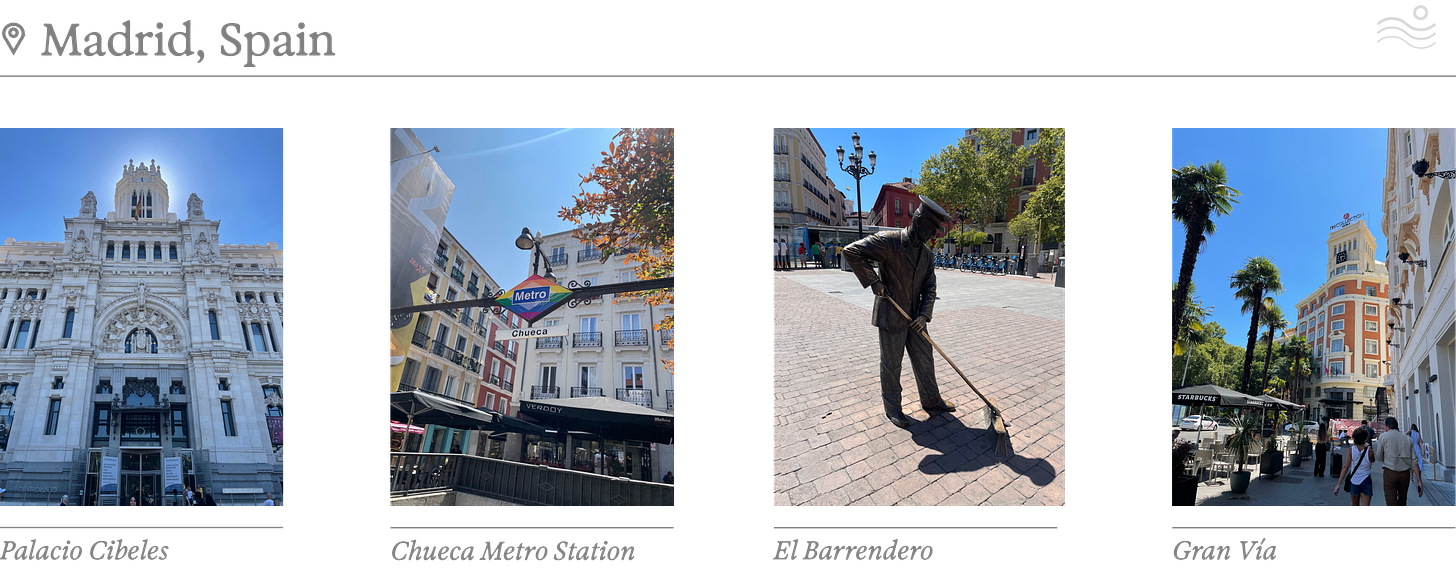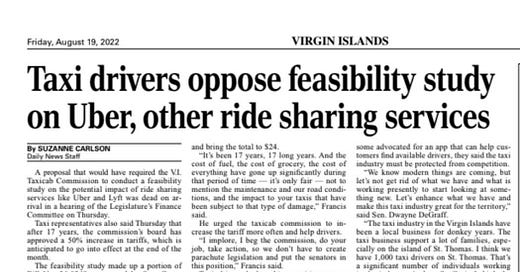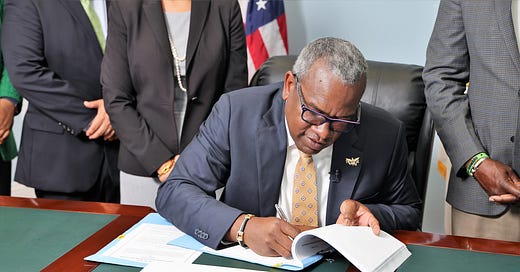
Discover more from CPSI Newsletters
The Right Way To Empire
Air travel pains, no one cares about your CXCs, Trinidad refreshes national symbols
Welcome to Disgruntled Musings, a compilation of quick commentary on the latest socio-political news and updates from across the Caribbean region. I’m your host Shem Best, podcast producer here at the CPSI.
Listen on Spotify:
Full Transcript:
Growing Flight Pains For BVI, LIAT Tries To Take Off
WIC News, CH Aviation
Name something that the Caribbean can’t quite get right no matter how many iterations rise from the ashes then crash and burn spectacularly. If you guessed air travel we should grab a coffee after this but you also win the prize of listening to me verbally fleece the experience of trying to get anywhere in or out of this cursed archipelago we call home.
“Do better!” - I’m paraphrasing BVI (British Virgin islands) Communications Minister Kye Rymer, who like most of us has just about had it up to here, with InterCaribbean’s antics. Inconsistent service from one of the region’s nascent carriers is a cause for concern according to Minister Rymer who urged the airline to work harder to rectify the situation, as air travel is integral to the Virgin Island’s commercial links with its neighbors. Inter’s fleet of 16 mostly Embraer island hoppers, has been hit with a raft of staffing problems and technical issues that have drawn the ire of its customers as of late. I was almost beginning to miss shitting on LIAT weekly, but my prayers have been answered and here we have a fresh lamb to slaughter that seems unable to maintain any semblance of reliability in a market devoid of any true competition. I mean c’mon it’s the British Virgin Islands… if you’re using Caribbean Airlines to get to Tortola, raise your hands… yea that’s what I thought.
Keeping to the skies…
LIAT 2020, the recently reanimated zombified remains of LIAT made its inaugural flight last week between Saint John’s and Castries, to the rapturous sound of crickets. Antiguan Prime Minister Gaston Browne has managed to scrape together a deal with Nigeria’s Air Peace for seven Embraer jets (one of which is reportedly already 23 years old - yikes) alongside 3 of the former ATRs from the dead and cold body of the company’s previous incarnation. Browne noted that the route map will expand as demand increases.
Listeners I don’t believe in kicking a dog while it’s down and I am a huge proponent of regional travel but as of writing they haven’t been able to even get their website in order and flights can only be booked via email or telephone, because this is the 1960s and we’ve got to plan ahead for the next leg of our journey aboard the QE2.
I have little to no faith in this venture. Air Peace, the Nigerian group with the majority stake in it, doesn't have the best track record either and certainly doesn’t share Gaston’s goal of an efficient EC air bridge based in Antigua. The prime minister is still laboring under the idea that LIAT’s competitors weren’t already circling like vultures. Caribbean Airlines certainly has left no uncertainty over its plans to gobble up the carrier’s former routes. It’ll probably need the revenue now that Frontier Airlines has set up shop right on its doorstep.
Speaking of which…
This episode is definitely not sponsored by Frontier Airlines, now offering direct flights from Bridgetown, Barbados and Port of Spain, Trinidad and Tobago to its hub in San Juan. Frontier’s foray into the Caribbean is due to a shift in the business models of American low cost carriers who are feeling the squeeze of higher fuel prices and overall operational costs which are eating into their razor thin margins. Frontier is keen to carve out a space in the region to funnel fliers to its Southern United States hubs, granting access to its wider North American Network. Good news if you don’t mind a layover in Puerto Rico for your next New York trip. Bad news if you’re a JetBlue or Caribbean Airlines shareholder, because a desperate competitor has now shifted its attention to a non-insignificant slice of your profit pie. Caribbean Airlines has already responded with San Juan flights of its own. So now we wait to see which one blinks first. My money’s on Frontier, they’ve got deeper pockets that aren’t reliant on shifty oil field deals with Venezuela.
A Corrupt Start in Haiti, CXC Performance On The Decline, Coat of Pan, Sint Maarten Parties To Form Coalition
Miami Herald, St. Lucia Times, Loop News, NL Times
I’ll give a five second break here for all necessary sighs and groans.
Haiti’s presidential transition council is currently embroiled in a bank bribery scandal. According to a report by the Miami Herald, three members of the dream team cornered the director of one of Haiti’s commercial banks and told him to cough up ¾ of a million Joe Biden dollars if he wanted to keep his job. Obviously this throws a wee bit of doubt on the integrity of the purported new era of governance. Eyebrows are now being raised all over Washington and they’re probably just as surprised as we all are… which is to say not at all.
Keep in mind this transitional council was just sworn in back in April following an action packed saga whereby the country’s capitol fell under the control of an ex-cop turned gangster named Barbecue who proceeded to block the then president of Haiti Ariel Henri from even re-entering the country following after a CARICOM Summit. This council has just as much legitimacy as Henri. Hell I’d even say it’s got less than Barbecue and at least he controlled Port-Au-Prince. Needless to say this revelation will do little to shake perceptions of Haiti’s status as a failed state, which is so far down the hole both regional and western powers are content to accept a veritable child’s tea party as the next phase of actual government.
Onto the mainland…
Guyana’s education ministry is slightly concerned that the number of students passing CSEC basketry has declined. Okay I’m being a bit dramatic but trust me the real story isn’t much less eye roll inducing. It’s no secret that Guyana boasts the “top performing” students in CSEC and CAPE. These are regional examinations overseen by the CXC. Guyanese students tend to mosey on out with the most grade 1 passes per student. This would be a laudable factoid if the certificates they were awarded weren’t in the most superfluous subjects, like actual textiles and basketry.
Let me just quote one particular Loop News article here:
Guyana recorded outstanding performances in seven subjects where students gained over 90 per cent. These include Agricultural Sciences (98.85 per cent), Theatre Arts (98 per cent) and Electronic Document Preparation (93 per cent).
Via Loop News
If I wore glasses I’d have tiredly removed them and stared at the camera sitcom style. Just earlier this year the CXC came under fire for removing the certificate for some agricultural subject due to disinterest and low numbers and surprise surprise, Trinidad and Guyana threw up a stink and called them shortsighted… I called them realistic. When did it become the job of the regional examination council to prop up the tree hugging delusions of the largest growing oil economy in CARICOM? And why are we still pretending that CXC certificates are worth having disputes over, let alone certificates in watching paint dry?
What’s Old is New, Coalition To Form In Sint Maarten
Trinidad Guardian, Loop News
Trinidad and Tobago’s PM Keith Rowley announced that the three ships in the country’s coat of arms will be replaced with the steel pan. Does he mean three steel pans or just one big- anyhow they also finally made the steel pan the country’s national musical instrument last month. Kinda shocking they only just got around to that.
So we’re sinking the Nina, Pinta and Santa Maria in favor of what most can agree is definitely better symbolism for Trinidad and Tobago. This to me is more of a cultural update, and far less about de-colonisation as some may quickly try to imply. Replacing some European ships on a European heraldic shield wouldn’t really be sticking it to the man. You’d have to throw the entire coat of arms out for that. Rowley says the change will be executed just before the country’s republic day. They just need time to get the new version out on government documents, signs etc. This is a relatively harmless change… I wonder what he’s hiding with this distraction.
Aaand finally…
The Dutch side of Sint Maarten’s just concluded a snap election and as a result of no majority victory will form a coalition government, again. Honestly I forgot this island was even a thing but if your news day has this as a headliner, it’s a slow ass day or you live on the island in question. Goodluck to you either way.
Long Talk: I’ve Seen A Real Commonwealth
How do the remnants of empire compare today?
Over the past week I was graciously given the opportunity to travel to Europe under the auspices of the CPSI and its partner organisation, Emergent Ventures. My trip took me through London and Dublin with a final stop in Madrid.
Today’s long talk is more of a trip down observation lane. As a citizen of Barbados I enjoy involuntary membership in His Majesty’s Commonwealth. The British Commonwealth is a loose conglomeration of ex-British colonies, excluding Gabon, Mozambique, Togo and Rwanda, who have decided to band together over a collective trauma. To my knowledge, the late Elizabeth II was instrumental in keeping the organization together with most if not all of the current prime ministers serving during her long reign. With virtually no trade or even symbolic cooperation between many of the 56 states, outside of the Commonwealth Games, it was her reign that was more or less seen as the glue for the bloc. One could say that it has been on the decline in relevance for some time, and I had even expected a more rapid collapse after Lizzy checked out but even as recently as 2022 Gabon joined so there’s that.
The British commonwealth to me is a very long winded, passive aggressive apology tour. It’s British so this is par for the course. The members are expected to perceive each other as equals but when you think about it that is virtually impossible given the range of populations and levels of economic stability possessed by the individual members. You need look no further than the Commonwealth Games to see the disparity between the likes of India and… well just about everyone else. As aforementioned some of these countries have negligible diplomatic ties amongst themselves beyond “yea we were enslaved too”. Britain for the most has actually withdrawn from the majority of its territories and tiptoes around the topic of their involvement with any of them. Conversations around the Commonwealth carry an air of tacit acknowledgement of an era we would rather not speak of but we also know it would be weird and unhealthy if we didn’t. The current organization embodies that awkwardness.
On my trip I got to visit the capitals of the empire, London and Madrid. Each carries the historical weight of their eras of conquest, but each wears it differently. Madrid displays their colonial history in more of a celebratory light. There is no Spanish Commonwealth because the ex-colonies do not view Spain as a “mother country”, but as another member of the Hispanic World. Spain having rapidly receded (involuntarily via several wars) is still instrumental in the development and governance of its former vassals but less as a form of atonement and more in line with good foreign policy. For example, Latin Americans have priority routes for immigration and naturalization in Spain which is reciprocated in kind by Latin American states. This is seen as an exchange of skills and culture to the betterment of the Hispanic World. Spanish politics continue to have influence on Latin American politics and vice versa. There is more homogeneity in the “Spanish Commonwealth” than its British equivalent. In fact in stark contrast, the conversation in the UK right now surrounding immigration, is objectively negative. Brits aren’t keen on a flood of Commonwealthers to their shores even though it’s a bit late for that particular concern given London’s status as a globally integrated city. The population and wealth disparity may come into play somewhat. Latin America is historically less politically stable than Spain, but outside of Venezuela, none of the ex-Spanish colonies have totally imploded. They also share many political ideologies that are expressed across the Spanish mainland microcosm. Latin American politicians often visit Spanish cities for political rallies, forums and discussions. Spain is far more integrated with its ex territories than Britain. It is much more representative of a true commonwealth than the British Commonwealth.
The end result is a beneficial transfer of ideas, art, food, policies and people that ideally the British Commonwealth wants to emulate but cannot due to the nature of its formation. Whereby the Spanish commonwealth is a much more natural evolution of the empire, the British commonwealth is the shattered remains of what could have been a globally integrated body. Of course there’s the middle ground, the French Commonwealth. This doesn’t actually exist because the French ended the question of citizenship decades ago. There are no vassals. Martinique is France. Guadeloupe is France. Reunion is France. Citizens of these islands vote for the French president and have as many rights as anyone in Paris. France embodies the final form of an empire, solidified with zero question of borders.
I suppose today’s musing is the question of which is the most successful final form of empire. Is it the Spanish version? A blended community of like-minded countries, independent but cognizant of a shared language and past that allows them to collaborate with little friction? Or the French version, where there is no question at all. Everything is France, France is everything. Long live Marianne.
What I can conclude is that the British version isn’t ideal. It’s dysfunctional, almost entirely symbolic and I still believe its waning relevance will reach a point someday that we won’t mention it at all in serious conversation.





















